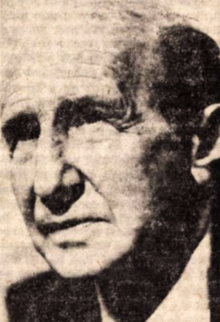D. I. Suchianu | |
|---|---|
 Suchianu in 1969 | |
| Born | Ion Suchianu September 2, 1895 Iași, Kingdom of Romania |
| Died | April 18, 1985 (aged 89) Bucharest, Socialist Republic of Romania |
| Occupation |
|
| Period | c. 1914–1985 |
| Genre |
|
| Literary movement | Viața Romînească |
Dumitru Ion Suchianu, most often shortened to D. I. Suchianu or D.I.S. (2 September 1895 – 17/18 April 1985), was a Romanian essayist, translator, economist and film theorist, also noted for his participation in politics. The son of a distinguished Armenian teacher-editor and his Romanian socialist wife, he was acquainted with, and inspired by, writer Ion Luca Caragiale, who visited his childhood home. Attending Iași's Boarding High School in the 1910s, he formed a lasting bond with Mihai Ralea. The two young men went on to study together at the University of Paris, where they earned their credentials as social scientists and political thinkers; Ralea also married Suchianu's sister Ioana. Their careers were tied to Viața Romînească magazine, put out by their mentor Garabet Ibrăileanu. It was here and in Adevărul newspaper that Suchianu made his reputation as a polemicist and essayist. His early writings tackled a variety of subjects, from political biographies and world affairs to legal history, a subject which also preoccupied him during his successive mandates at the Legislative Council. After 1927, he became directly involved in the ideological and aesthetic steering of Romanian cinema, as a columnist, film historian, censor, and eventually producer.
Though publicly critical of Marxism, Suchianu established connections with the underground Romanian Communist Party during his stint at Cuvântul Liber newspaper. He continued to cultivate and defend communist intellectuals after taking over as co-editor of Viața Romînească in 1937, though he also struck controversy with his positive remarks on the fascist Iron Guard. In 1938, he and Ralea were co-opted by the dictatorial King Carol II, serving within his National Renaissance Front. Suchianu merged his positions at the Labor Ministry, held by Ralea, and the Ministry of Propaganda to establish a program of mass entertainment for the Romanian proletariat—the film component of a Muncă și Voe Bună leisure-package. He visited Nazi Germany and Fascist Italy to seek his inspiration, while explaining that he still did not favor the complete fascization of Romania. Suchianu was ultimately sacked in mid-1940 by Prime Minister Ion Gigurtu, with prosecutors sent in to investigate him as an alleged embezzler. This uncertain status was prolonged during the National Legionary State, established by the Iron Guard in 1940–1941, and then under the early years of the Ion Antonescu regime. He was never brought to trial, and Antonescu eventually allowed him to travel throughout Nazi-occupied Europe; this episode left Suchianu exposed to accusations of collaborationism.
Suchianu said he had secretly supported the Soviet Union, and also to have directly participated in the August 1944 coup, which toppled Antonescu. He continued the leftward shift at Viața Romînească, with a new edition put out in 1944–1948, while also engaged in propaganda work for the National Populars, as well as for the Communist Party's own Bloc of Democratic Parties. He renounced his journalistic activities upon the imposition of a communist regime in 1948, and withdrew from literary activity altogether, until 1956; he was also imprisoned for a while, possibly as a means of ensuring Ralea's own political compliance. When he reemerged, it was almost exclusively as a translator and film critic, earning particular distinction, and the reading public's enduring affection, in the latter field. His essays mounted an academic defense of Hollywood crowd-pleasers against the cinematic avant-garde, and overlapped with affectionate memoirs of the silent film era.
Late-communist reviewers celebrated Suchianu as a founding figure of Romanian film criticism, and, in some cases, identified him as a fellow student of Marxism-Leninism—though he was already a public critic of communist censors. His critical views of communism became known to the public from his 1980s interviews with Grid Modorcea, in the uncensored version published after the 1989 Revolution. An avid practitioner of various sports, and a certified ski instructor, Suchianu earned additional notoriety for his longevity and well-preserved agility, outliving Ralea by 20 years. He died at the age of 89, having continued to write until his last days.